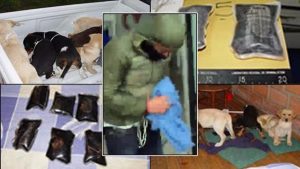As a new survey shows 95% of chefs cite customers getting sick as their top concern, a computer system developed by Columbia University with Health Department epidemiologists can detect foodborne illness and outbreaks in New York City restaurants based on keywords in Yelp reviews.
 Using Yelp, 311, and reports from health care providers, the Health Department has identified and investigated approximately 28,000 complaints of suspected foodborne illness overall since 2012 and helped Health Department staff identify approximately 1,500 complaints of foodborne illness in NYC each year, for a total of 8,523 since July 2012.
Using Yelp, 311, and reports from health care providers, the Health Department has identified and investigated approximately 28,000 complaints of suspected foodborne illness overall since 2012 and helped Health Department staff identify approximately 1,500 complaints of foodborne illness in NYC each year, for a total of 8,523 since July 2012.
Improvements to the computer system are the subject of a joint study published this week by the Journal of the American Medical Informatics Association. The Health Department and Columbia continue to expand the system to include other social media sources, such as Twitter, which was added to the system in November 2016. The computer system allows the Health Department to investigate incidents and outbreaks that might otherwise go undetected. New Yorkers are encouraged to call 311 to report any suspected foodborne illness.
“Working with our partners at Columbia University, the Health Department continues to expand its foodborne illness surveillance capabilities,” said Health Commissioner Dr. Mary T. Bassett. “Today we not only look at complaints from 311, but we also monitor online sites and social media. I look forward to working with Columbia University on future efforts to build on this system. The Health Department follows up on all reports of foodborne illness – whether it is reported to 311 or Yelp.”
Each year,
“Effective information extraction regarding foodborne illness from social media is of high importance–online restaurant review sites are popular and many people are more likely to discuss food poisoning incidents in such sites than on official government channels,” said Luis Gravano and Daniel Hsu, who are coauthors of the study and professors of Computer Science at Columbia Engineering. “Using machine learning has already had a significant impact on the detection of outbreaks of foodborne illnesses.”
“The collaboration with Columbia University to identify reports of food poisoning in social media is crucial to improve foodborne illness outbreak detection efforts in New York City,” said Health Department epidemiologists Vasudha Reddy and Katelynn Devinney, who are coauthors of the publication. “The incorporation of new data sources allows us to detect outbreaks that may not have been reported and for the earlier identification of outbreaks to prevent more New Yorkers from becoming sick.”
“I applaud DOHMH Commissioner Bassett for embracing the role that crowdsourcing technology can play in identifying outbreaks of foodborne illness. Public health must be forward-thinking in its approach to triaging both everyday and acute medical concerns,” said Brooklyn Borough President Eric Adams.
Most restaurant-associated outbreaks are identified through the Health Department’s complaint system, which includes 311, Yelp, and reports from health care providers. Since 2012, the Department has identified and investigated approximately 28,000 suspected complaints of foodborne illness overall. The Health Department reviews and investigates all complaints of suspected foodborne illness in New York City.
 The recall announced by Shenandoah Growers’ last week involves a couple of brands also in November’s massive recall, which was ignited by Florida Department of Agriculture testing. This product pull, according to the company-written, FDA-posted recall notice, followed FDA testing in Miami of basil grown at Puerto Vallarta Herbs SAS farms in Colombia.
The recall announced by Shenandoah Growers’ last week involves a couple of brands also in November’s massive recall, which was ignited by Florida Department of Agriculture testing. This product pull, according to the company-written, FDA-posted recall notice, followed FDA testing in Miami of basil grown at Puerto Vallarta Herbs SAS farms in Colombia.


 Amy, Sorenne and I (right, not exactly as shown) started out this morning on our Spring Food Safety Speaking Tour – Bite Me ’09.
Amy, Sorenne and I (right, not exactly as shown) started out this morning on our Spring Food Safety Speaking Tour – Bite Me ’09.